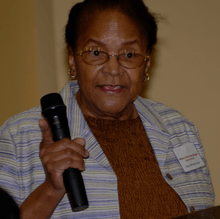Joyce Mitchell Cook

Joyce Mitchell Cook (October 28, 1933 – June 6, 2014) was an American philosopher. She was the first African American female to receive a Ph.D in philosophy in the United States. After earning that degree from Yale University, she was the first female teaching assistant allowed at the university. She went on to be a professor at Bryn Mawr College, Howard University, and Connecticut College. She served for several years as an analyst for African affairs at the State Department in Washington.
Education
Cook was one of 12 children born to Rev. Isaac W. Sr., and Mary Belle Christman Mitchell in Sharon, Pennsylvania, on October 28, 1933.[1] She attended Sharon High School and then Bryn Mawr College in 1951, where she intended on majoring in chemistry.[2] She took her first philosophy course her freshman year, and then, inspired by her readings and professors, graduated from Bryn Mawr with a B.A. in philosophy in 1955.[3] She then received a double M.A. in psychology and philosophy from Oxford University in 1957. After this, she went to Yale to receive her Ph.D. in philosophy in 1965.[2]
Career
While at Yale, Cook edited the Review of Metaphysics and worked at the Yale University Press.[2] She was the first female teaching assistant at Yale for any non-language class.[1] It has been speculated that she was not just the first black female to receive a philosophy Ph.D in the United States, but in the entire world.[2] After Yale, Cook served as an analyst for African affairs in the State Department in Washington. She also worked as an editor in New York and for several years in the Office of Economic Opportunity. She was a professor at Wellesley University, Howard University and Connecticut College.
Later life
Cook completed her dissertation on the value theory,[4][5] and was interested in this philosophy until her death. She became active in civil rights in the middle of her life. Cook also served on the Jimmy Carter administration as a speech writer and correspondence editor.[1] She was in the middle of writing a book on the black experience[4] when she died of illness on June 6, 2014.[1]
Awards and recognition
In 2007, Cook received the Flame Award from the Collegium of Black Woman Philosophers. George Yancy, an African American philosopher who interviewed Cook for his book African-American Philosophers: 17 Conversations, wrote in a letter that he sent to a fellow philosopher shortly after Cook's death:
Joyce was an unprecedented philosophical figure, and a very special friend. She was incredibly principled. I will remember her unfailing ethics, her brilliant wit, her deeply embodied laughter, and her pecan pie, which was out of this world.[6]
The American Philosophical Association presents the Joyce Mitchell Cook Award biennially to a "trailblazing black woman philosopher".[7] Yale University hosted the Joyce Mitchell Cook Conference in November 2015, where many scholars and pioneers in philosophy gathered to honor Cook.[8] Yancy gave the inaugural address.[9]
References
- 1 2 3 4 "Dr. Joyce Mitchell Cook". The Herald. Retrieved 2015-12-15.
- 1 2 3 4 Yancy, George (1998-01-01). African-American Philosophers: 17 Conversations. Psychology Press. ISBN 978-0-415-92100-8.
- ↑ "Bryn Mawr College: Department of Philosophy". www.brynmawr.edu. Archived from the original on 2015-10-19. Retrieved 2015-12-15.
- 1 2 "Joyce Mitchell Cook Award – The American Philosophical Association". www.apaonline.org. Retrieved 2015-12-15.
- ↑ "APRAF Berlin: Dr. Joyce Mitchell Cook". adrianpiper.com. Retrieved 2015-12-17.
- ↑ "FW: DEATH: Dr. Joyce Mitchell Cook (1933–2014)". permalink.gmane.org. Retrieved 2015-12-17.
- ↑ "APA's Inaugural Joyce Mitchell Cook Award Winner Announced". Daily Nous. Retrieved 2015-12-17.
- ↑ "Joyce Mitchell Cook Conference". philosophy.yale.edu. Department of Philosophy. Retrieved 2015-12-17.
- ↑ "FW: DEATH: Dr. Joyce Mitchell Cook (1933–2014)". permalink.gmane.org. Retrieved 2015-12-17.